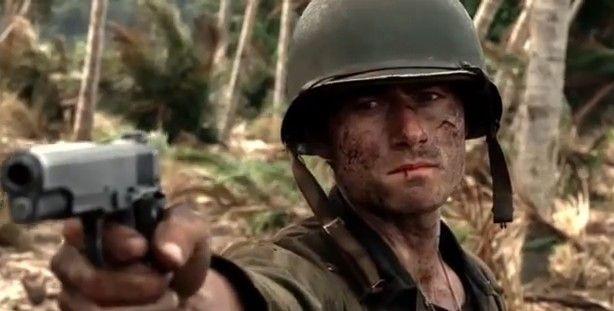For The Pacific, the 10-part saga of a group of US Marines involved in the campaign to drive back the rampant Japanese army in the aftermath of Pearl Harbor, Spielberg has resumed the executive producer role he adopted to make Band of Brothers nearly a decade ago, once again in partnership with Tom Hanks. Filmed on location in Australia at a cost of $230m, it's reckoned to be the most expensive TV series ever made, and the screen is duly crammed with wall-to-wall action – naval fleets and landing craft, dogged Marines digging in against charging hordes of Japanese soldiers, squadrons of aircraft thundering overhead, and a lifetime's supply of artillery barrages, dismembered corpses and machine-gun fire. The battle sequences on Guadalcanal in this opening double episode bristled with fizzing tracer bullets, headbanging explosions and bone-crushing hand-to-hand combat, leaving you feeling as scorched and concussed as the Marines themselves.
Spielberg has commented that the primary aim of the series was "to honour the veterans of the Pacific theatre", who have historically been overlooked in comparison with the European war. Despite the arsenal of digital technology which has been applied to the process of recreating the hellish Pacific campaign, with its pitiless heat, tropical diseases and frenzied loathing between the two sides, The Pacific also seems to want to remember the kind of America that existed in the first half of the 20th century, the country that sent "The Great Generation" to war. The series has been based on memoirs by two Marines who appear as leading characters in the series: Helmet for my Pillow by Robert Leckie (played by James Badge Dale) and With the Old Breed by Eugene Sledge (Joe Mazzello). Both are portrayed as the kind of honest, uncomplicated characters who have tended to crop up in Spielberg's "entertainment" movies. Their motivations for wanting to join up and fight are an inbred sense of patriotic duty, uncluttered by politics, and a feeling that failure to volunteer is an unforgiveable abdication of responsibility.
According to the actor who plays him, Leckie "was an Irish kid from New Jersey and he joined the Marines because he wanted to join the toughest fighting force he possibly could. He wanted to test himself to the extreme and they also paid an extra $5 a month, which is beer money." As for Sledge, initially he couldn't get into the war because of a heart murmur, and could barely endure the shame of seeing his buddies marching off without him. Eventually his father, a doctor, reluctantly passed him fit to enlist, before recalling the veterans he'd treated from the First World War, who'd "had their souls torn out".
On this first look, The Pacific lacks the weight and texture of Band of Brothers, which yielded memorable performances from Damian Lewis, Ron Livingston and Donnie Wahlberg among others. So far, this cast feels somewhat colourless and two-dimensional, but that may change as the drama develops. The series doesn't look much interested in exploring the geopolitical causes of the war in the Pacific either, and the portrayal of the Japanese as a bunch of shrieking fanatics fit only to be mown down in waves has advanced remarkably little beyond the kind of attitudes displayed in period pieces like the Errol Flynn vehicle, Objective Burma.
There was even a scene recalling the latter movie where the Marines came across the bodies of a couple of Americans, grotesquely mutilated by the enemy. This time the Americans got to dole out some comeuppance, torturing a Japanese soldier by methodically riddling him with non-lethal bullet wounds. The tone was set by the Sergeant bawling instructions to the Marines as they prepared to hit the beach: "When you see the Japs, kill 'em all!"
Yet you know it all really happened, and it probably happened pretty much like this. As Tom Hanks chillingly put it: "The Pacific was white people fighting yellow people with an absolute hatred for everything the other side stood for. It was a look at war for the future. We've fought that brand of war and we're still fighting it now."















Add comment